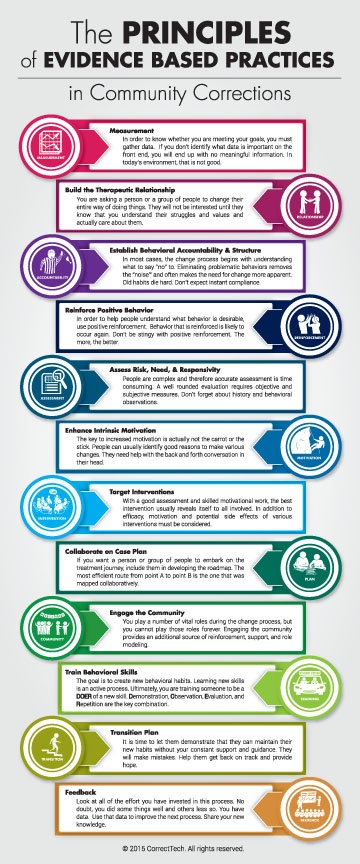- Home
- Software
- Support and Services
- Programs We Serve
- EBP
- Testimonials
- Blog
- About Us
- Resources
Our goal is to create new behavioral habits in our clients and learning new skills is an active process. Demonstration, observation, evaluation and repetition are the key combination. Do more than give clients the rules; really train them to handle any situation.
Ever wondered why you continue with bad habits even when they serve no purpose other than to create pain? Human nature is frustrating.
Most correctional professionals agree that behavioral change starts with acquiring new skills, however we often do a particularly poor job implementing this principle. It is not for a lack of trying. Without a solid foundation in the neuropsychology of habits and behavior change, we typically start with a false assumption. That assumption is that a lack of information is central to the behavior problem. When your assumption of the problem misses the mark, your intervention will too.
There are two primary types of learning.
Declarative learning involves information that can be verbalized or declared. For example: Who was the 16th President of the United States? What does a red light mean? In each case, you access your memory for the answer. Declarative learning is vital to a variety of tasks, but behavioral change isn’t one of them.
There is a big difference between learning facts, figures and declarative information and learning processes, known as procedural learning. While there is certainly information involved, it can rarely be verbalized; it must be demonstrated or experienced. For example, you can read a book about learning to play golf but that doesn’t mean you’ll be any good on the golf course.
For some processes, declarative information is not helpful; sometimes it can get in the way. Processes can only be learned through experience. Procedurally learned behaviors that get practiced often become "overlearned." When that happens, the brain switches on the autopilot. It performs automatically, without the value or burden of declarative information. While the automatic nature of the autopilot may seem dangerous, it can be valuable. But how is it really practiced?
Consider the overlearned complex processes in your life that trigger the autopilot to take over: hitting a golf ball, driving a car and hammering a nail. Guess what else is a process: coping skills, problem solving, social skills and emotion management… in other words, personality.
There is a down side to the autopilot. A behavior learned in one situation may be completely inappropriate for another situation. The autopilot is not sensitive to environmental or situational differences. What happens when the autopilot takes over and performs a process that is not a good match for the current situation?
Practice Makes… Habit
Overlearned behaviors become habits. Humans are a compilation of good and bad habits. While those habits may be life saving in one situation, in another they can be life threatening. When those habits result in criminal activity, it is not a nuisance but a recipe for personal and societal destruction.
Remember that feedback tends to take control away from the autopilot and return it to the thinking part of the brain. In addition, competing behaviors require experience and practice. When real life experience is not an option, role-playing is the next best thing. Observe. Practice. Give feedback. Repeat.
Remember: your common and accepted practices can be codified, measured and evaluated for continuous feedback.
We've developed our technology to make behavioral skills training an easy part of every case manager's day. Click on our software icons below to see how we've implemented reinforcement in our software.

CorrectTech offers integrated software and support services for residential, treatment, reentry, juvenile and probation programs. Our community corrections software was designed by community corrections professionals to guide organizations toward a powerful EBP implementation, relieve them of strenuous paperwork and manual processes, and enable them to focus on what matters - people! To request more information or schedule a demonstration of our software, click here.
CorrectTech, Inc.
info@correcttech.com
Copyright 2018 CorrectTech, Inc. All Rights Reserved.